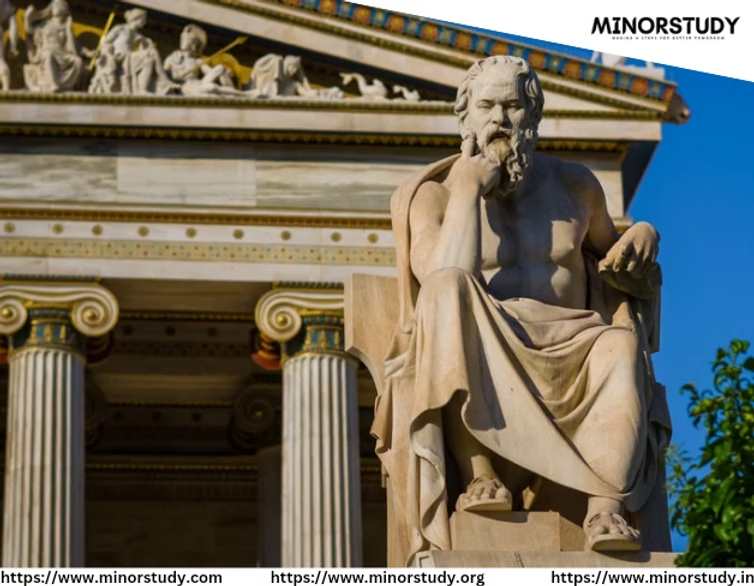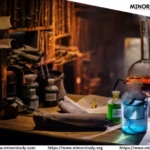Classics – Ancient Philosophy (Minor)
Faculty: Arts and Social Sciences Type: Minor
The Classics – Ancient Philosophy (Minor) program focuses on the study of ancient Greek and Roman philosophy, exploring the foundational ideas that shaped Western thought and continue to influence modern philosophy, ethics, politics, and science. This minor is ideal for students interested in understanding the philosophical traditions of the ancient world, from pre-Socratic thinkers to the Stoics, Epicureans, and Neoplatonists.
Key Learning Outcomes
Philosophical Foundations: Develop a deep understanding of the major schools of thought in ancient philosophy, including the works of Plato, Aristotle, Socrates, and others.
Critical Analysis: Learn to critically engage with primary philosophical texts, analyzing arguments, assumptions, and implications.
Ethical and Political Theory: Explore ancient conceptions of ethics, morality, and politics, particularly how they influenced later Western moral and political thought.
Logical and Argumentative Skills: Hone the ability to construct and evaluate logical arguments, a key skill in philosophy and various other disciplines.
Cultural and Historical Context: Understand how ancient philosophical ideas were shaped by the cultural and political contexts of their time, and how they continue to impact modern discussions in ethics, metaphysics, and epistemology.
Core Curriculum
The Classics – Ancient Philosophy (Minor) introduces students to the key figures and ideas of ancient philosophy, offering a mix of historical, textual, and thematic approaches to the study of classical philosophical works.
Foundational Courses
Introduction to Ancient Philosophy
A survey of major philosophical figures and movements from the Pre-Socratics to the Hellenistic philosophers, focusing on their contributions to metaphysics, ethics, and logic.
Plato and Aristotle
A deep dive into the works of Plato and Aristotle, exploring their views on knowledge, ethics, politics, and the nature of reality.
Ethics in Ancient Philosophy
Exploration of ethical theories from ancient thinkers such as Socrates, Plato, Aristotle, and the Stoics, examining their views on virtue, happiness, and the good life.
Intermediate Courses
Socratic Philosophy and Method
Study of the life and teachings of Socrates, focusing on his method of dialectical questioning and his contributions to moral philosophy and epistemology.
Hellenistic Philosophies: Stoicism and Epicureanism
A study of the philosophical schools that emerged after Aristotle, including Stoicism and Epicureanism, with an emphasis on their ethical and practical applications to daily life.
Ancient Metaphysics
Examination of ancient metaphysical ideas, including the nature of reality, the soul, causality, and the concepts of being and becoming, as discussed by Plato, Aristotle, and other early philosophers.
Ancient Political Philosophy
Analysis of political thought in ancient Greece and Rome, focusing on the ideal state, justice, and citizenship, with special attention to the works of Plato, Aristotle, and Cicero.
Advanced Courses
Neoplatonism and Late Antiquity
A study of the philosophical tradition that emerged in the 3rd century CE, focusing on the writings of Plotinus, Porphyry, and other Neoplatonists and their interpretation of Platonic thought.
Ancient Philosophy and Modern Thought
Exploration of how ancient philosophical ideas influenced later philosophical movements, such as the Renaissance, Enlightenment, and modern philosophy, and their relevance to contemporary issues.
The Legacy of Ancient Philosophy
A capstone course that looks at the continuing influence of ancient philosophy on fields such as theology, science, and politics, examining its impact on Western and non-Western traditions.
Capstone Project or Paper (Optional)
A final research project or paper that allows students to explore a specific aspect of ancient philosophy in greater depth, applying their knowledge to a focused topic of interest.
Skills Acquired
Philosophical Analysis: Ability to read, interpret, and critically analyze complex philosophical texts from the ancient world.
Argumentation and Logic: Development of strong logical reasoning and argumentative skills, useful in both academic and professional settings.
Ethical Reasoning: Understanding of ethical principles that underpin ancient philosophical systems and their application to contemporary moral dilemmas.
Historical and Cultural Awareness: Knowledge of the historical context in which ancient philosophy developed and its influence on the modern world.
Written and Oral Communication: Enhanced ability to present philosophical ideas clearly, both in writing and speech, and to engage in intellectual debates.
Career Opportunities
While the Classics – Ancient Philosophy (Minor) is not directly vocational, it provides valuable skills for a wide range of careers that require critical thinking, research, and communication. Some potential career paths include:
Academia/Researcher
Further study in philosophy, history, or the humanities, leading to a career in teaching or research.
Philosophy Consultant
Advising organizations or individuals on ethical dilemmas or philosophical issues, applying ancient ethical frameworks to modern challenges.
Law
Preparing for law school by developing skills in argumentation, critical reasoning, and ethical analysis.
Public Policy
Applying philosophical reasoning to the creation of policies on social justice, ethics, and governance.
Writer/Editor
Writing, editing, or publishing works related to philosophy, literature, or cultural history, especially in academic, literary, or media outlets.
Nonprofit and Advocacy Work
Working in nonprofits or advocacy organizations where ethical reasoning and an understanding of ancient political thought can inform decision-making and policy development.
Political Consulting
Applying the insights gained from ancient political philosophy to modern political systems, helping shape policies or advising political campaigns.
Cultural Heritage and Museum Work
Working in museums, cultural institutions, or archives, preserving and interpreting ancient philosophical works and ideas for the public.
Why Choose This Program?
Rich Intellectual Tradition: Ancient philosophy has had a lasting impact on modern thought, and studying it provides insights into the foundations of Western intellectual traditions.
Critical Thinking Skills: The program hones important skills in critical analysis, argumentation, and logical reasoning, which are valuable in various careers and disciplines.
Cross-Disciplinary Relevance: The minor is highly interdisciplinary, connecting philosophy with literature, politics, history, and ethics, and is beneficial for students in a wide range of fields.
Cultural and Ethical Insights: By studying the moral and political ideas of ancient philosophers, students gain a deeper understanding of ethics and governance that can inform modern decisions.
Timeless Relevance: The issues discussed by ancient philosophers—such as justice, virtue, knowledge, and the nature of existence—remain relevant and provide a basis for addressing contemporary concerns.
Conclusion
The Classics – Ancient Philosophy (Minor) offers students an opportunity to engage deeply with the philosophical ideas that have shaped Western thought for millennia. Through the study of key philosophers and schools of thought from ancient Greece and Rome, students gain valuable skills in critical thinking, argumentation, and ethical reasoning, all of which are applicable to various fields such as law, politics, education, and public policy. This minor provides a strong foundation for further academic study or a career that requires deep analytical and philosophical insight.








